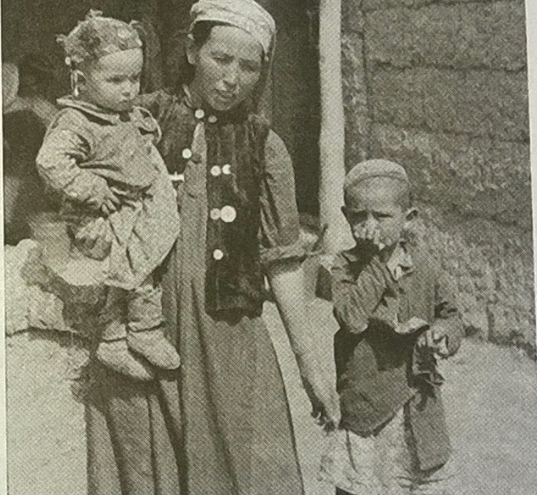
The status of women in family relationships changed depending on age, the number of children born, authority among related families, etc. The principles of patriarchal-feudal morality regarding married women can be summarized as follows: a woman must obey her husband, not engage in disputes with him; she must respect and honor all of her husband's relatives, and she is obliged to strictly adhere to behavioral norms within the family and among relatives; in the morning, she should rise earlier than everyone else and start household chores, and in the evening, she should go to bed late; she should speak less, not interfere in men's conversations, etc.
A woman's entire life took place at home, within the circle of women in the family, the family-kin group, and the village community. In addition to household work, she was also engaged in processing livestock products, handicrafts, sewing clothes, etc. Furthermore, she was required to assist in various labor processes for related families. N.I. Grodekov noted: "...the daughter-in-law belongs not to an individual, but to the clan" (Grodekov, 1889, p. 12).
In undivided families, a woman obeyed and dutifully followed not only her husband's orders but also all instructions from older daughters-in-law and her husband's parents. Although the situation for women remained difficult even in small families, there was still a weakening of the patriarchal spirit in family relationships. In a small family, a woman was considered the mistress and made decisions independently; she was subordinate only to her husband; in her husband's absence, she performed his household duties.
Overall, changes in the predominant type of family did not lead to a radical change in the status of women in the family and society.
Women continued to depend on their husband's arbitrariness.
If the financial situation allowed, a husband could take a second wife. In this case, he would set up a separate yurt for each wife and divide all property between them. Each wife managed her household and looked after the portion of property allocated to her. "If a Kyrgyz man took a third wife, then a portion from the allocations of the first two wives would be separated to pay the bride price for the third wife, and property would also be redistributed among the three wives.
The same would be done in the case of taking a fourth wife" (Kislyakov, 1977, pp. 41, 42). This "was required for proper household management and to prevent quarrels between the wives, especially in the event of death" (Ibid). In such a family, the younger wife, in addition to her husband, was completely subordinate to the older wives. The eldest wife managed all household tasks and monitored the behavior of the younger women.